463 Search Results for autism
April 12, 2015
by Carole Zangari -
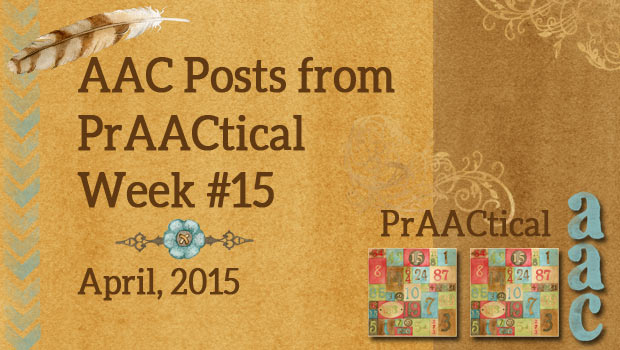
Monday – 20 Ways for SLPs to Celebrate Autism Awareness and Acceptance Month Tuesday – PrAACtical Thoughts on Mastery Wednesday – Video of the Week: AAC for Students Who Can Speak Thursday – How We Do It: S’MORRES and Partner Augmented Input with Dr. Jill Senner & Matthew Baud Friday – Autism Support Lives Here
April 8, 2015
by Carole Zangari -
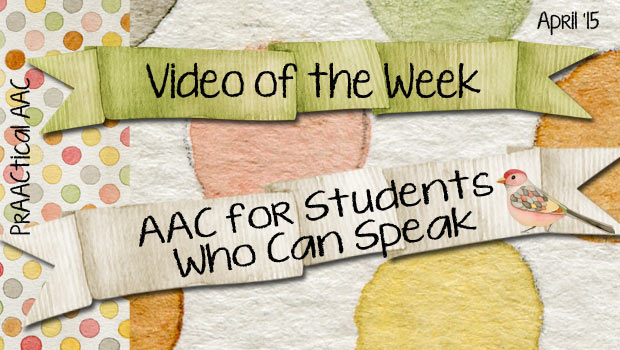
“But my student can speak. Why would we use AAC?” We often get this question from our fellow SLPs, particularly those who work with students who have autism. From the question alone, it seems like AAC is not needed, and would be a step backward for this particular student. But what happens when we dig a little deeper? The last time this question was posed to me, it was about Marcella, an 8 year old with ASD. As the conversation progressed, we learned more about Marcella’s communication profile. Independently, she uses 2-3 word sentences to ask for things she wants (e.g., “Want that popsicle.” “More Dora”) and single words to protest (“No!”). With prompting Marcella uses 1-2 words for greeting (e.g., “Hi Tony”), labelling (e.g., “Dora book”), answer questions, (e.g., “here,” “sunny”) and a few other social purposes. So, what’s the problem? For starters, Marcella is capable of more. In... [Read More...]
April 5, 2015
by Carole Zangari -
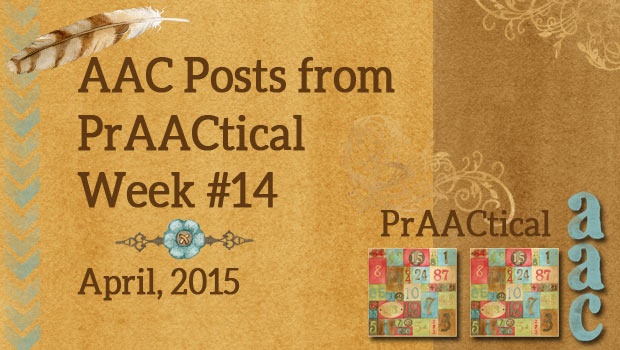
Monday – PrAACtically April: A Month of Core Tuesday – Core Vocabulary Resources for April Wednesday – Video of the Week: AAC and ASD Thursday – How I Do It: Making a Back-up for High Tech AAC by Jeanne Tuthill Friday – Beyond World Autism Day
April 1, 2015
by Carole Zangari -
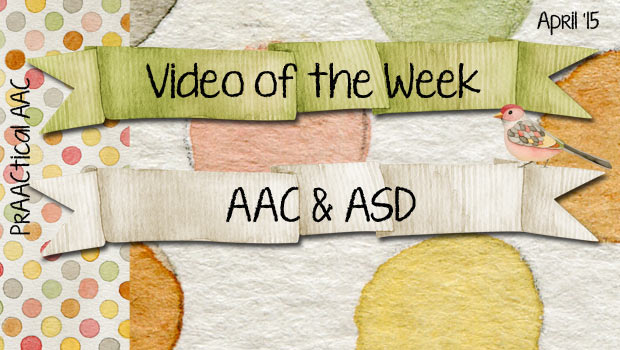
To kick off Autism Awareness and Acceptance month, we turn to a video on AAC and ASD. Thanks to Michael McSheehan and the Institute on Disability at the University of New Hampshire for this helpful video. https://vimeo.com/album/2645578/video/97834273
March 5, 2015
by Carole Zangari -
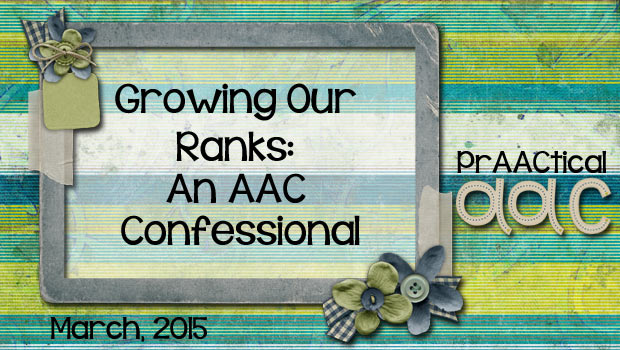
It’s funny where life takes you. A former student of mine was unhappy as an attorney, but found deep satisfaction in becoming an SLP. Another one enjoyed her work as an SLP, but reached even more lives by founding a company for low tech communication and literacy materials. As SLP students, we might not have considered the role that people with AAC needs would play on our caseloads. And with over 90% of school-based SLPs serving kids with autism, my guess is that many who are now supporting nonverbal or minimally verbal students had no intention of specializing in AAC. And yet, there they are: a language lifeline for students who cannot communicate effectively through speech. I am so grateful to today’s guest author, Sara Barnhill, for sharing her own experience in becoming an AAC service provider. Sara is an SLP who has has worked at Children’s Hospital of Richmond at... [Read More...]
February 16, 2015
by Carole Zangari -
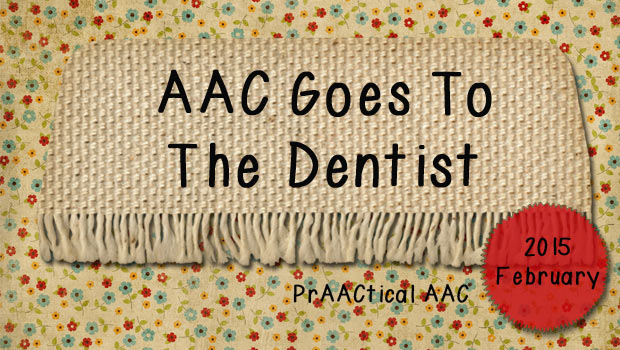
If you are among those who believe that AAC is a 24/7 proposition, then, like us, you may be looking for ways that we SLPs can better support our clients in the community. Like the rest of us, our AAC clients want and need to be active participants in their healthcare, and we can play an important role in helping them build the receptive and expressive communication skills to be more successful in that. In today’s post, we hear from Dr. Rachel Menzies (Email: r.menzies@dundee.ac.uk) from the AAC Research Group in the School of Computing at the University of Dundee. Dr. Menzies shares ways in which her team is developing social narratives around visiting the dentist. I’ve never been a fan of going to the dentist, but I am lucky. I have the cognitive capacity and understanding to consider the consequences of NOT going to the dentist and to regulate my emotions when I... [Read More...]
January 19, 2015
by Carole Zangari -
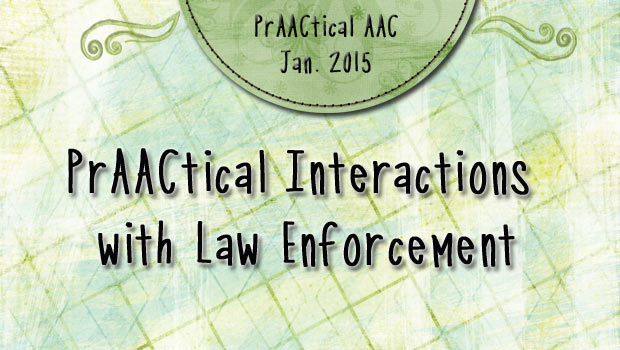
If you were ever stopped by the police, you know that it can be an anxiety-producing situation. Even when you’ve done nothing wrong, your heart may race, your hands may tremble, and you may stumble over your words. It is easy to imagine how much more difficult these situations would be for those with speech disabilities, particularly those with problems in social interaction. At a meeting a few weeks ago, I was excited to learn about The Wallet Card Project, a collaborative effort between the Disability Independence Group, the Coral Gables Police Department, and the UM-NSU Center for Autism and Related Disabilities (UM-NSU CARD). The Wallet Card Project created free materials to be used in helping individuals with Autism Spectrum Disorder (ASD) and their families gain skills in interacting successfully with police. The trainings address applicable laws in an easy-to-understand fashion that includes both real examples and hypothetical scenarios. Participants... [Read More...]
January 12, 2015
by Carole Zangari -
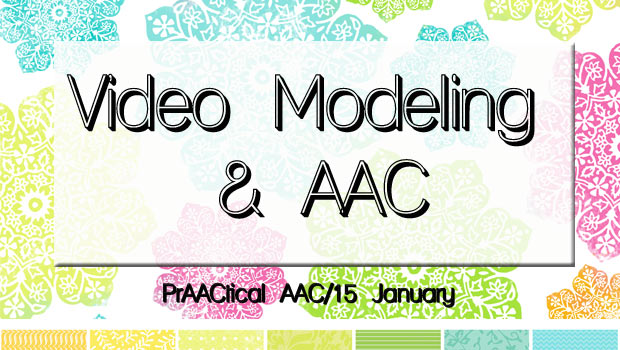
Video modeling is an empirically supported instructional strategy that can help some learners acquire and use a range of new skills. It involves videotaping the expected or desired behavior so that our clients can see, hear, and better understand the skills they are trying to learn. We’ve posted videos about it in the past and know that many of you use it or have considered using it in your clinical practice. Most of the applications have been with speaking children and young adults, but many AAC learners can benefit as well. If you’re thinking of trying out this strategy in your own practice, here are some resources that might be helpful. In a nutshell: Visit the National Center for Professional Development on Autism to review the EBP practice brief on video modeling. Their documents are great for sharing with families and other team members, too. Getting started: Visit Dr. Christine Reeve’s... [Read More...]
December 7, 2014
by Carole Zangari -

Do you get questions about effective AAC practices for individuals with autism? This video, featuring Dr. Joanne Cafiero, provides a helpful review of some of the issues. Many thanks to AssistiveWare for hosting this video.
November 23, 2014
by Carole Zangari -

We’re always happy to find resources that can help our prAACtical learners deal with complex emotions. In this post, we return to the work of Joel Shaul, author of the Autism Teaching Strategies site. We saw the first 4 videos in this post. Video 5: Anxiety – Predicting Without Proof Video 6: When Your Mind Gets Stuck on Sad Video 7: When Your Mind Blames Too Much Video 8: Rigid Thinking









